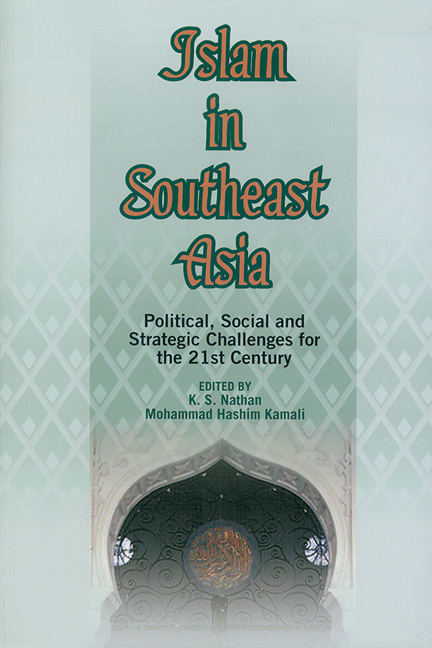Book contents
- Frontmatter
- Contents
- Preface
- Introduction: Understanding Political Islam Post-September 11
- PART ONE ISLAMIC DOCTRINE, HISTORY, GROWTH AND INSTITUTIONS IN SOUTHEAST ASIA
- PART TWO POLITICS, GOVERNANCE, CIVIL SOCIETY AND GENDER ISSUES IN SOUTHEAST ASIAN ISLAM
- PART THREE MODERNIZATION, GLOBALIZATION AND THE ‘ISLAMIC STATE’ DEBATE IN SOUTHEAST ASIA
- 11 Islam and Modernization
- 12 Modernization and the Process of Globalization: The Muslim Experience and Responses
- 13 The Malaysian Constitution, the Islamic State, and Hudud Laws
- 14 The Islamic State: Origins, Definition, and Salient Attributes
- PART FOUR IMPACT OF SEPTEMBER 11 ON ISLAMIC THOUGHT AND PRACTICE
- CONCLUSION: Addressing the Challenge of Political Islam in Southeast Asia
- Note on Contributors
- About the Editors
- Index
13 - The Malaysian Constitution, the Islamic State, and Hudud Laws
from PART THREE - MODERNIZATION, GLOBALIZATION AND THE ‘ISLAMIC STATE’ DEBATE IN SOUTHEAST ASIA
Published online by Cambridge University Press: 03 November 2017
- Frontmatter
- Contents
- Preface
- Introduction: Understanding Political Islam Post-September 11
- PART ONE ISLAMIC DOCTRINE, HISTORY, GROWTH AND INSTITUTIONS IN SOUTHEAST ASIA
- PART TWO POLITICS, GOVERNANCE, CIVIL SOCIETY AND GENDER ISSUES IN SOUTHEAST ASIAN ISLAM
- PART THREE MODERNIZATION, GLOBALIZATION AND THE ‘ISLAMIC STATE’ DEBATE IN SOUTHEAST ASIA
- 11 Islam and Modernization
- 12 Modernization and the Process of Globalization: The Muslim Experience and Responses
- 13 The Malaysian Constitution, the Islamic State, and Hudud Laws
- 14 The Islamic State: Origins, Definition, and Salient Attributes
- PART FOUR IMPACT OF SEPTEMBER 11 ON ISLAMIC THOUGHT AND PRACTICE
- CONCLUSION: Addressing the Challenge of Political Islam in Southeast Asia
- Note on Contributors
- About the Editors
- Index
Summary
INTRODUCTION
Malaysia has a record of racial, cultural and religious tolerance that should be the envy of all plural societies. Mosques, temples, churches and gurdwaras dot the landscape. Citizens celebrate each others’ religious festivals. Unlike in some other democracies where religious/communal riots erupt with painful regularity and where holy places of minority religions are often razed to the ground, in Malaysia there is much inter-religious friendship and tolerance. Cultural and religious pluralism are not only tolerated, they are celebrated. Religious extremism and attempts to disrupt religious harmony are severely dealt with. Unlike in England where blasphemy is an offence only against the Church of England, the Malaysian Penal Code in sections 295–298A punishes offences against all religions.
Legislation has been introduced to provide for Muslim and non-Muslim religious institutions. Among the laws existing are: Islamic Banking Act 1983, Islamic Development Bank Act 1975, Islamic Family Law (Federal Territories) Act 1984, Syariah Court Evidence (Federal Territories) Act 1997, Syariah Courts (Criminal Jurisdiction) Act 1965, Syariah Criminal Offences (Federal Territories) Act 1997, Syariah Criminal Procedure (Federal Territories) Act 1997 and 122 State Enactments and Ordinances on Islamic matters in the thirteen states of the Federation. In relation to non-Muslim religious affairs the prominent laws are: Daughters of Charity of the Canossian Institute (Incorporation) Ordinance 1957; Synod of the Diocese of West Malaysia (Incorporation) Act 1971 (Act 36); Muslim and Hindu Endowments Ordinance (Cap. 175); Cheng Hoong Teng Temple (Incorporation) Act 1949 (Act 519); Pure Life Society (Suddha Samajam) (Incorporation) Ordinance 1957; Superior of the Institute of the Congregation of the Brothers of Mercy (Incorporation) Act 1972 and Superior of the Institute of the Franciscan Missionaries of Mary (Incorporation) Ordinance 1957.
Financial allocations and tax exemptions are granted to all religions. Foreign priests and missionaries are allowed permits to enter and work in the country. Christian and Hindu festivals are marked by national holidays. Missionary hospitals, schools, bookshops and hostels abound. Christian missionary teachers are often retained till age sixty-five, a privilege not enjoyed by other religious teachers. Hotel rooms throughout the nation carry the King James Version of the Bible. At the same time the direction of the Muslim qiblat (direction of prayer towards the Ka'ba) is required to be indicated in every hotel room. Liquor shops are allowed.
- Type
- Chapter
- Information
- Islam in Southeast AsiaPolitical, Social and Strategic Challenges for the 21st Century, pp. 256 - 277Publisher: ISEAS–Yusof Ishak InstitutePrint publication year: 2005

